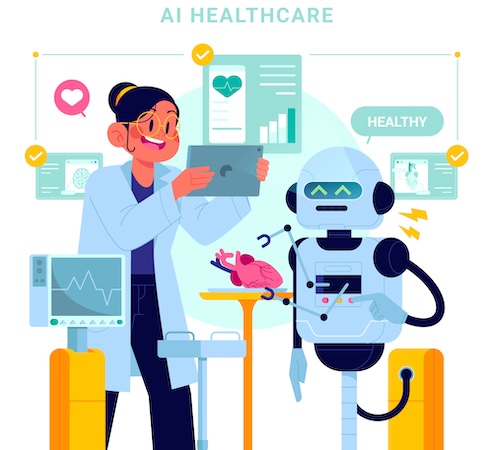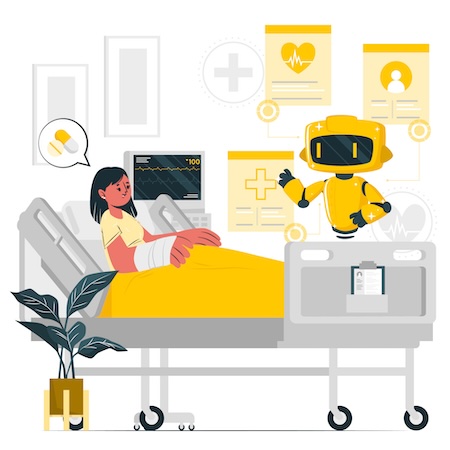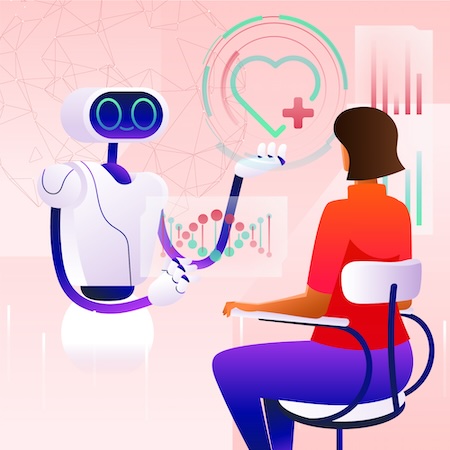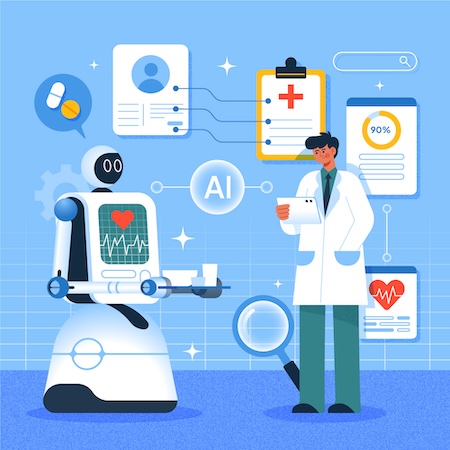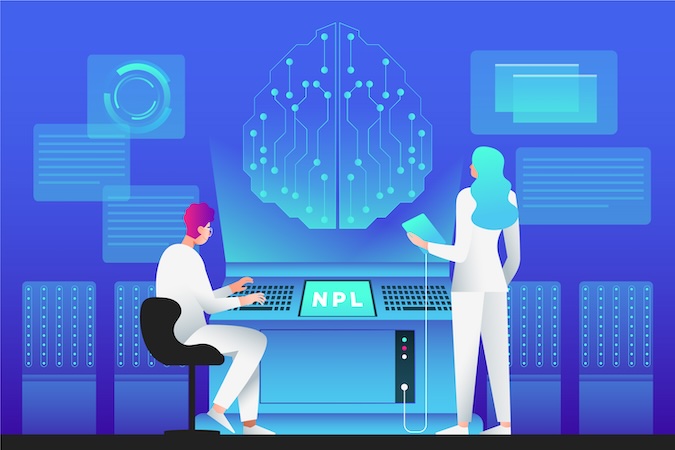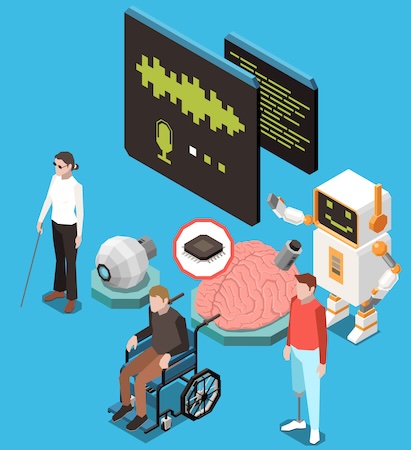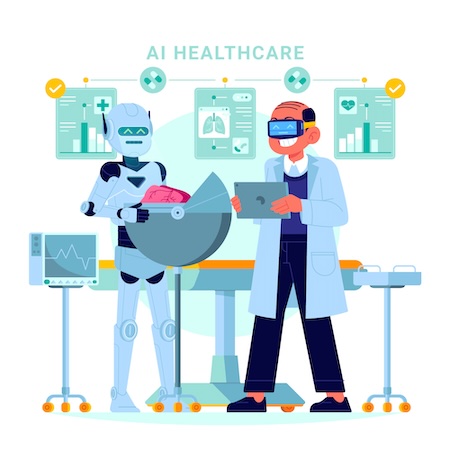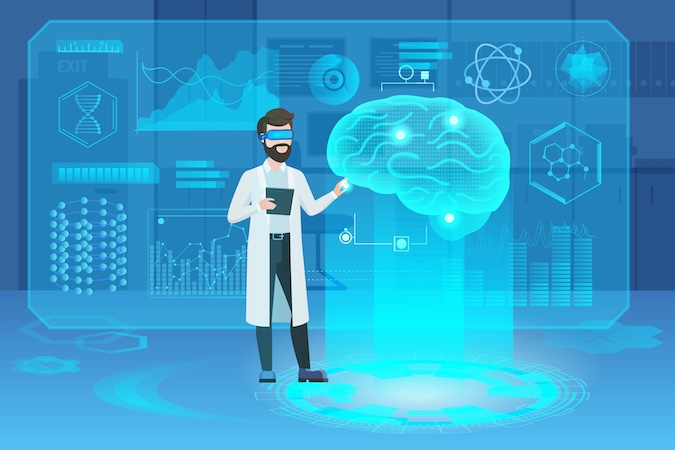Diving into the world of healthcare, have you ever paused to marvel at how rapidly it’s evolving? Gone are the days when automation in the healthcare industry was a distant dream. Today, it stands at the cusp of a revolution, all thanks to generative artificial intelligence (aka GenAI).
This is your gateway to understanding how this technology is not only enhancing but fundamentally transforming medical practices. Imagine a world where efficiency and accuracy are not the goals but the starting points. Ready to leap into the future? Let’s unravel the magic of generative AI and explore its boundless potential for medical practice automation.
Top Takeways:
- Generative AI is revolutionizing healthcare automation by transforming how medical practices operate. From streamlining patient data management to crafting personalized care plans, this technology is automating tasks that were once time-consuming and prone to human error. The result? Enhanced efficiency, accuracy, and a more personalized approach to patient care, setting a new standard in healthcare delivery.
- While the potential of generative AI in medical automation is vast, implementing these solutions comes with its set of challenges. Navigating regulatory compliance, ensuring data privacy, and integrating AI systems with existing healthcare infrastructures are significant hurdles. However, with careful planning and the right partnerships, overcoming these obstacles is not just possible but paves the way for a more innovative and efficient healthcare ecosystem.
Table of Contents:
Understanding Generative AI in the Medical Field
The Potential of Generative AI in Healthcare
Why Automate Your Medical Practice with GenAI?
Generative AI Applications in Medical Practices
Planning Your AI Journey: A Step-by-Step Guide
- Step 1: Assessing Your Needs and Setting Clear Objectives
- Step 2: Choose the Right AI Solutions
- Step 3: Partner with Experts
Case Studies: Success Stories of GenAI in Healthcare
Overcoming Challenges in Implementing Generative AI
How Topflight Hands You Plug-and-Play Practice Automation
The Future of Healthcare with Generative AI
Understanding Generative AI in the Medical Field
In the realm of healthcare, where every second count and precision is non-negotiable, the marriage of automation and healthcare is not just beneficial; it’s revolutionary. At Topflight, we’re at the vanguard of weaving generative AI into the fabric of healthcare IT, crafting systems that are not only efficient but remarkably intelligent. But let’s dive deeper—what does this mean for you, the visionary founders and astute clinical executives?
What is Generative AI?
Generative AI stands out as a beacon of innovation in the dense fog of medical jargon. It’s the engine behind the new wave of automated systems in healthcare, designed to generate new data that mirrors its training input. This ability of the machine learning technology to produce text, images, and even make predictions opens a world of possibilities for healthcare applications.
Advantages of Generative AI in Healthcare
Curious about how generative AI can revolutionize your medical practice?
Precision and Personalization:
- Automated systems analyze patient data in real-time, enhancing care quality.
- Supports clinical decisions with insights and recommendations, reducing errors.
Read more on clinical decision support systems implementation
Efficiency Boost:
- Frees up healthcare professionals’ time by automating time-consuming tasks like data analysis.
- Allows focus on patient care rather than administrative burdens.
Revolutionizing Patient Outcomes:
- Predictive analytics foresee health issues, enabling preventative care.
- Tailored treatment plans meet individual patient needs, considering overlooked factors.
Generative AI is reshaping healthcare, moving it towards a future where everything from patient data management to diagnostic procedures is enhanced. As pioneers in healthcare IT, Topflight is your ideal partner in navigating this journey. Our expertise ensures that your practice can fully leverage the potential of generative AI, making healthcare more efficient, accurate, and personalized than ever.
In the sections to follow, we’ll explore how generative AI can transform various aspects of medical practice, sharing success stories and practical insights. Join us in embracing the future of healthcare, where automation and human expertise combine to create outcomes that were once thought impossible.
The Potential of Generative AI in Healthcare
In the bustling world of healthcare, where every decision and action can have massive implications, the role of technology, particularly AI, has become increasingly paramount. As we delve deeper into the capabilities of generative AI, it’s evident that its potential to transform the health industry is vast and multifaceted. Let’s explore how this innovative technology can lead to significant advancements in medical practice automation and overall healthcare delivery.
Defining Generative AI: Capabilities and Mechanisms
Generative AI, at its core, is about creating something new. Unlike traditional AI systems that interpret or classify data based on existing patterns, generative AI takes a step further by producing novel data points, insights, or predictions. How does it achieve this?
- Learning from Data: Generative AI algorithms are trained on extensive healthcare data, learning intricate patterns and relationships.
- Predictive Modeling: These systems can forecast outcomes, such as disease progression, by analyzing patient data against learned models.
- Data Generation: Beyond prediction, they can simulate realistic healthcare data for research or training purposes without compromising patient privacy.
This capability opens up numerous possibilities for automation in the health care sector, making processes more efficient and insightful.
Also Read: How to Build a Healthcare Chatbot
Breaking Down Complex Terms: What Does This Mean for Your Practice?
For healthcare professionals and executives, the advent of generative AI signifies a monumental shift in how medical practices operate. But what tangible benefits does it offer? Here’s a breakdown:
- Enhanced Patient Insights: By analyzing vast amounts of health data, generative AI can uncover hidden patterns, offering deeper understandings of patient health and potential treatment pathways.
- Personalized Care: Tailored treatment plans become the norm, as AI algorithms predict individual patient responses to various treatments based on historical data.
- Operational Efficiency: Routine tasks, from patient scheduling to processing healthcare data, are streamlined, allowing staff to focus on more critical, value-added activities.
The integration of generative AI into medical practice automation directly addresses the pressing needs of the health industry for efficiency, accuracy, and personalized patient care.
The Unseen Potential
While the applications and advantages of generative AI in healthcare are vast, the true potential lies in its ability to continuously learn and adapt. As more healthcare data becomes available, these systems become even more accurate and insightful, leading to a virtuous cycle of improvement in patient care and operational efficiency.
The journey toward fully automated systems in healthcare is both exciting and inevitable. Generative AI stands at the forefront of this revolution, promising to reshape the landscape of medical practice automation.
For healthcare providers and executives, embracing this technology means not only keeping pace with the evolution of the health industry but also setting new standards for quality, efficiency, and patient satisfaction. At Topflight, we’re committed to leading this charge, ensuring that our partners are equipped with the most advanced AI tools to transform their practices and the lives of those they serve.
Why Automate Your Medical Practice with GenAI?
In the swiftly evolving landscape of healthcare, the drive towards efficiency and accuracy is more than a trend—it’s a necessity. But why should your practice jump on the automation bandwagon, and how does generative AI fit into this picture?
The Rising Demand for Efficiency and Accuracy in Healthcare
Have you ever wondered why there’s so much buzz around automation in the medical industry? It’s not just about keeping up with technology trends; it’s about genuinely enhancing the quality of care we provide to our patients. Here’s why:
- Time is of the Essence: In healthcare, time saved is lives saved. Automating routine tasks can significantly reduce the time spent on administrative work, allowing healthcare professionals to focus on patient care.
- Reducing Human Error: Let’s face it; even the best of us can make mistakes. Automation, particularly when powered by AI, minimizes these errors by providing consistent, precise outcomes.
- Scalability: As your practice grows, so does the workload. Automation enables scaling operations efficiently without compromising the quality of care.
Addressing Common Concerns: Privacy, Security, and Trust
While the benefits of automation in healthcare and AI integration are clear (e.g., it’s potential to improve productivity), concerns around privacy, security, and trust are valid and deserve attention:
- Privacy and Data Protection: With stringent regulations like HIPAA in the U.S., protecting patient data is paramount. Generative AI systems are designed with privacy in mind, ensuring that all data is anonymized and secure.
- Security Measures: The thought of cyber threats can be daunting. However, leading AI solutions incorporate robust security protocols to safeguard against breaches, ensuring your patient data remains protected.
- Building Trust: Adopting new technologies requires a leap of faith. By choosing reputable partners like Topflight, known for our expertise in developing secure and compliant healthcare applications, you can navigate this transition with confidence.
While concerns around privacy and security are understandable, working with experienced partners can help mitigate these risks, allowing you to focus on what matters most—delivering exceptional patient care.
As we explore the applications of generative AI and automation opportunities for medical practices in the following sections, keep in mind the transformative potential it holds for your practice. From streamlining administrative tasks to enhancing diagnostic procedures, the possibilities are endless.
Generative AI Applications in Medical Practices
The integration of generative AI into healthcare is not just a leap forward; it’s a necessary evolution to meet the growing demands of modern medicine. With health automation becoming increasingly prevalent, let’s explore how generative AI is reshaping various aspects of medical practices, making healthcare options more accessible, enhancing healthcare management, and improving patient care through electronic means.
Patient Data Management: Beyond Simple Storage
In healthcare management, patient data is gold. But managing this goldmine has traditionally been fraught with challenges. Enter generative AI:
- Generative AI can sift through vast amounts of data, organizing and categorizing patient information in a fraction of the time it would take manually.
- By analyzing historical data, AI algorithms can predict patient trends, helping healthcare providers anticipate needs and allocate resources more effectively.
Personalized Patient Care Plans: A New Frontier
Personalized care is the future of medicine, helping improve patient outcomes. Generative AI makes this future a reality today by leveraging data to tailor care plans to individual patients:
- AI algorithms analyze patient histories, genetic information, and lifestyle factors to recommend personalized treatment plans and help patients stay on track.
- As new data becomes available, AI systems can adjust care plans in real-time, ensuring that patients always receive the most effective treatments.
Streamlining Administrative Tasks: From Scheduling to Billing
Healthcare management is notoriously complex, with scheduling and billing often cited as significant pain points. Generative AI offers a solution:
- AI-powered systems can manage appointment scheduling and appointment reminders, reducing wait times and optimizing healthcare providers’ schedules.
Explore the role of artificial intelligence in medical billing to understand how it enhances productivity and accuracy.
- Generative AI can streamline the billing process, ensuring accuracy and reducing the time spent on administrative tasks.
- AI bots can write simple reports 10x faster than humans and with fewer (typically none) errors.
Also Read: A Guide to Cost of AI in Healthcare
Enhancing Diagnostic Procedures with AI
The role of AI in diagnostics cannot be overstated. With its ability to analyze and interpret medical images and data, generative AI is revolutionizing diagnostic procedures:
- AI algorithms can detect abnormalities in medical images with precision often surpassing human capabilities.
- By automating the analysis process, generative AI can provide diagnostic results more quickly, enabling timely treatment decisions.
The Role of Chatbots and Smart Assistants in Medical Practice Automation
One of the most exciting applications of generative AI in healthcare is the development of intelligent chatbots. These chatbots are not your average automated responders; they are sophisticated tools that can significantly enhance patient engagement and operational efficiency:
- Enhanced Remote Patient Monitoring: Chatbots can check in with patients, monitor their health status, and alert healthcare providers to any changes or concerns.
- Patient Education: Through natural language processing, chatbots can answer patients’ questions, explain conditions, and provide valuable health information. This definitely helps improve patient satisfaction.
- Medical Chart Assistance: Healthcare providers can work with easy-to-use chatbots to quickly access and interpret medical charts, reducing the time spent on paperwork and allowing more time for patient care.
By automating routine tasks, personalizing patient care, and enhancing diagnostic procedures, AI is freeing up healthcare professionals to focus on what they do best: caring for patients. As we move forward, the integration of AI into healthcare will continue to expand, offering even more innovative healthcare options and improving the overall quality of care.
Planning Your AI Journey: A Step-by-Step Guide
Embarking on the journey of integrating generative AI into your medical practice is akin to setting sail towards uncharted territories—exciting yet filled with uncertainties. How do you ensure that your venture into health care automation not only succeeds but thrives? Let’s navigate through this together, step by step, ensuring that you leverage automation technology in healthcare to its fullest potential for you practice management.
Summary Table for Planning Your GenAI Journey
| Step | Description | Key Actions |
|---|---|---|
| Step 1: Assess Needs and Set Objectives | Define the challenges you want to address and set measurable goals for AI integration. | Identify specific practice challenges, determine how AI can enhance patient care, and set long-term objectives to measure the impact of automation. |
| Step 2: Choose the Right AI Solutions | Select AI tools tailored to your practice’s needs and goals. | Evaluate models like GPT, BioBERT, ClinicalBERT, and Med-PaLM. Align their capabilities with your practice’s automation and patient care objectives. |
| Step 3: Partner with Experts | Collaborate with experienced healthcare app developers to implement automation effectively. | Look for partners with expertise in healthcare, experience in EHR integration, proven success in AI tools development, and a commitment to collaborative project execution. |
Step 1: Assessing Your Needs and Setting Clear Objectives
Before diving headfirst into the vast ocean of healthcare automated systems, it’s crucial to anchor down your automation needs. Ask yourself:
- What specific challenges am I aiming to address with automation?
- How can generative AI enhance the patient experience and improve outcomes?
- What are my long-term goals for incorporating automation technology in my practice?
Setting clear, measurable objectives at this stage will guide your decisions and help quantify the impact of implementing automation solutions.
Step 2: Choosing the Right AI Solutions for Your Practice
With a myriad of automation solutions available, selecting the right fit for your practice can seem daunting. However, focusing on your assessed needs will illuminate the path forward. Among the most transformative technologies to consider are large language models, which have shown remarkable success in various applications within healthcare:
GPT by OpenAI
Renowned for its advanced text generation and understanding, making it ideal for patient communication and support.
BioBERT
A domain-specific language representation model pre-trained on large-scale biomedical corpora. BioBERT has shown significant performance improvements in biomedical text mining tasks such as named entity recognition, relation extraction, and question answering.
ClinicalBERT
Developed specifically for clinical notes, ClinicalBERT is fine-tuned from BioBERT and has been used to predict hospital re-admission and other clinical outcomes.
Med-PaLM
A large language model designed to provide high-quality and accurate answers to medical questions. It has shown promising results in medical comprehension, knowledge retrieval, and reasoning capabilities.
These models represent just the tip of the iceberg in the realm of generative AI. By aligning the capabilities of these models with your practice’s specific needs, you can unlock tailored automation solutions that drive efficiency and elevate patient care.
Embarking on the journey of integrating generative AI into your medical practice? Begin with a solid foundation by exploring how to develop a healthcare app, which will guide you through incorporating these advanced AI solutions seamlessly into your projects.
Step 3: Partnering with Experts: What to Look for in a Development Partner
The journey towards healthcare automation is not one to embark on alone. When it comes to bringing these innovative solutions to life, partnering with experienced healthcare app developers is crucial. The right development firm can make the difference between a smooth sail and rough seas. But what should you look for in a partner?
- Expertise in Healthcare: A partner with a deep understanding of the healthcare industry’s unique challenges and regulatory landscape will navigate your project with insight and precision.
- Experience with integrating EHRs: Essential for seamless healthcare operations, your development partner should have a robust track record of successfully integrating EHRs with the latest AI technologies.
- Proven Track Record: Look for success stories and case studies that demonstrate their ability to deliver effective automation tools in healthcare.
- Commitment to Collaboration: Your development partner should be just that—a partner. Seek out teams that prioritize collaboration and are committed to understanding and achieving your objectives.
As you chart your course through the integration of generative AI and automation technologies in healthcare, remember that the journey is as important as the destination. By carefully assessing your automation needs, selecting the right AI solutions, and partnering with experts, you’re setting your practice up for unparalleled efficiency, improved patient outcomes, and a future-proofed approach to healthcare delivery.
Also Read: A Guide to EHR in Medical Billing
Case Studies: Success Stories of GenAI in Healthcare
The transformative power of generative AI in healthcare is not just theoretical; it’s a reality that’s reshaping the landscape of medical practice today. By exploring real-life examples of automation in healthcare, we can better understand the impact of this technology and the vast automation possibilities it unlocks for private healthcare firms and various healthcare organizations. Let’s delve into some compelling case studies that highlight generative AI’s impact of automation in healthcare.
Innovaccer
Location: US, Middle East
Technology: Data platform for value-based healthcare
Impact: Innovaccer integrates clinical, claims, and other data across systems, such as Electronic Health Records (EHRs), creating unified patient records of high quality. This healthcare technology helps healthcare providers make data-driven decisions, which has led to:
- Over $1.5 billion in healthcare cost savings
- More than 39 million patients on the Health Cloud
- $4 million in shared savings and a 7% reduction in 30-day readmissions noted by partnering Accountable Care Organization network.
Viz.ai
Location: US
Technology: Digital care coordination platform powered by AI
Impact: Viz.ai accelerates the detection of cardiac and neurovascular conditions and directs patients to the right specialist. With real-time connection to healthcare systems’ data streams, it has achieved:
- 87 minutes saved in time to treatment
- 3.5-day reduction in hospital stay
- 16% increase in the number of procedures
- 23% reduced disability from a stroke
Here are also a couple of examples of automation in the healthcare sector from our portfolio.
GaleAI
Location: USA
Technology: AI-Powered Medical Coding Platform.
Impact: GaleAI is redefining medical coding efficiency with its AI-driven platform, delivering super-human coding accuracy that was once thought impossible. By integrating with EHR and medical APIs, GaleAI has not only streamlined the coding process but also significantly reduced the possibility of human error. Its impact includes:
- Achieving up to 15% higher revenue for healthcare providers by ensuring accurate and comprehensive medical coding.
- Reducing the time spent on analyzing thousands of notes to just a few seconds, thus drastically cutting down on administrative overhead.
- Demonstrating a 97% decrease in time required for medical coding tasks, thanks to its sophisticated NLP, Deep Neural Network, and OCR technologies.
- Identifying 7.9% more codes than human coders during a 1-month audit, translating into approximately $1.14M in recaptured revenue annually for providers.
GaleAI exemplifies how generative AI can optimize administrative costs, standardize coding practices, and minimize PHI exposure while ensuring full HIPAA compliance.
Allheartz
Location: USA
Technology: Computer Vision for Physiotherapy and Sports Care
Impact: Allheartz is at the forefront of revolutionizing physical therapy and sports care by employing computer vision technology to monitor and enhance patient recovery. This novel approach automates menial tasks for healthcare professionals and provides AI-guided exams that generate actionable data for effective treatment plans. Key impacts include:
- Reducing the necessity for in-person patient visits by up to 50%, thereby optimizing healthcare delivery and patient convenience.
- Enabling better patient outcomes through AI-guided examinations, which offer detailed insights into patient progress and recovery.
- Cutting down clerical work by up to 80%, allowing doctors and coaches to focus more on patient and athlete care rather than paperwork.
These examples underscore the transformative potential of generative AI in healthcare, demonstrating significant improvements in operational efficiencies, patient care, and overall healthcare service delivery
Overcoming Challenges in Implementing Generative AI
Integrating generative AI into your medical practice heralds a new era of efficiency and innovation, yet it’s not without its hurdles. As with any significant transformation, particularly one as groundbreaking as automated healthcare, there are challenges to navigate. Let’s address these head-on, equipping you with the knowledge to overcome them.
Navigating Regulatory Compliance and Ethical Considerations
The healthcare industry is tightly regulated, and for good reason—patient safety and privacy are paramount. When introducing AI-based solutions, it’s crucial to remain compliant with regulations such as HIPAA in the U.S., GDPR in Europe, and other local data protection laws. But how do you ensure compliance while innovating?
Conduct a thorough risk assessment: Before implementing generative AI solutions, evaluate potential risks related to patient data and privacy. This proactive approach helps identify and mitigate vulnerabilities early on.
Stay informed about changes in legislation: Regulatory landscapes are ever-evolving. Keeping abreast of updates ensures your practice remains compliant and protects patient data effectively.
Ethical AI use: Beyond legal requirements, consider the ethical implications of AI in healthcare. Transparent use of patient data, preserving human oversight in clinical decisions, and ensuring AI solutions do not introduce biases are essential considerations.
Related: HIPAA Compliant App Development Guide
The Technical Side: Integration with Existing Systems
One of the technical challenges of adopting generative AI for medical office automation is ensuring it seamlessly integrates with your existing healthcare systems, such as EHRs. Achieving this integration can be complex, given the variety of software standards and platforms in use. Here are some strategies to tackle this issue:
Choose AI solutions with proven compatibility: Opt for AI technologies that have a track record of successful integration with various healthcare systems. Vendors often provide case studies or references from similar implementations.
Leverage APIs and interoperability standards: Utilize application programming interfaces (APIs) and adhere to interoperability standards like HL7 FHIR to facilitate smooth data exchange between AI applications and existing systems.
To see that wiring in action, check out our guide to SMART on FHIR healthcare app development, where we turn those standards into production-ready code.
Partner with experienced developers: Collaborating with development partners who have expertise in healthcare IT can significantly ease the integration process. They can navigate the technical intricacies, ensuring a smoother transition.
Change Management: Cultivating an AI-ready Culture in Your Practice
Implementing generative AI isn’t just a technical upgrade—it’s a cultural shift. Encouraging an AI-ready culture within your practice is vital for successful adoption. Here’s how to foster this environment:
Educate your team: Demystify AI for your staff by providing training and resources. Understanding how AI tools work and the benefits they bring can alleviate apprehensions and build confidence in using new technologies.
Involve key stakeholders early: Engage clinicians, administrative staff, and IT personnel from the outset. Their insights can guide the implementation process, ensuring the solutions meet actual needs and fit seamlessly into daily workflows.
Promote a mindset of continuous improvement: Encourage openness to change and experimentation. An environment that views technological advancements as opportunities for growth will adapt more readily to the integration of AI.
How Topflight Hands You Plug-and-Play Practice Automation
Manual coding, data-hunting, and clipboard triage still drain clinical hours that should belong to patients. When GaleAI’s founders wanted a coder that could think faster than humans, they turned to Topflight. In just 1,100 engineering hours we delivered an MVP that finds CPTs in seconds, lifts provider revenue 15 %, and slashes coding effort 97 %, while surfacing 7.9 % more billable codes than veteran coders.
Automation also has a bedside manner: our Mi-Life chatbot lets caregivers pull HIPAA-safe patient data with a voice prompt, cutting medication errors and winning rave staff-satisfaction scores at a busy group-home network. The takeaway? We don’t just design workflows—we replace them with reliable bots and AI that keep clinicians in their zone of genius.
Why medical-practice teams pick Topflight
-
AI + RPA under one roof – NLP, computer vision, and UI-driven bots work in tandem, so the right tool tackles each micro-task.
-
EHR-native plumbing – SMART-on-FHIR launches and HL7 v2 fallbacks mean automations survive version bumps and vendor quirks.
-
Compliance on autopilot – HIPAA, SOC 2, and role-based access controls baked in from sprint one; auditors see a tidy log, not red flags.
-
Metrics that sell themselves – Revenue lift, error-rate drops, and cycle-time cuts wired into dashboards at MVP, arming you with board-ready proof.
The Future of Healthcare with Generative AI
The horizon of healthcare is being reshaped right before our eyes, courtesy of generative AI. This transformation is not just about the evolution of technology but a revolution in how we approach automating healthcare processes, enhancing patient care, and redefining operational efficiencies. Let’s explore what the future holds for automation in hospitals and the broader medical field, guided by insights into hospital industry trends, the role of automation systems, and the significance of IT automation.
Predictions and Trends: What’s Next for AI in Medicine?
Automating Healthcare Workflows
The next wave in healthcare is set to bring an unprecedented level of automation to mundane and complex tasks alike. Imagine a world where administrative tasks, patient scheduling, and even preliminary diagnostics are handled swiftly and seamlessly by AI. This not only frees up valuable time for healthcare professionals to focus on direct patient care but also reduces the margin for error, ensuring more reliable and consistent patient experiences.
Also Read: Automate Medical Records: A Complete Guide
Enhanced Patient Interaction
As generative AI continues to mature, we anticipate a significant shift in how patients interact with healthcare services. From AI-driven chatbots that provide instant responses to patient queries to sophisticated virtual health assistants capable of monitoring patient health and offering personalized advice, the future promises a more engaged and informed patient populace.
Precision Medicine
Tailoring medical treatment to the individual characteristics of each patient is not a new concept, but AI is set to take it to new heights. By analyzing vast datasets, AI can identify patterns and predict outcomes with astonishing accuracy, paving the way for highly personalized treatment plans that are more effective and have fewer side effects.
Preparing for the Future: Skills, Knowledge, and Mindset
Embracing Automation in Hospitals
For hospital administrators and healthcare executives, the push towards process automation comes with its challenges but also a plethora of opportunities. Investing in robust automation systems within hospitals is not merely about upgrading technology; it’s about transforming care delivery models for better outcomes. Leaders must stay abreast of advancements in AI and automation, evaluating how these can be integrated into their operations to enhance efficiency and patient care.
Fostering IT Automation:
The backbone of successful AI integration in healthcare lies in sophisticated IT automation frameworks. These systems are crucial for managing the vast amounts of data generated in healthcare settings, from patient records to real-time monitoring data. Healthcare providers must prioritize building or upgrading their IT infrastructure to harness the full potential of AI, ensuring data is accessible, secure, and leveraged effectively.
Cultivating a Forward-Thinking Culture
Perhaps the most critical aspect of preparing for an AI-driven future is fostering a culture that embraces innovation, continuous learning, and adaptability among all stakeholders. Encouraging healthcare professionals to engage with AI tools, understand their benefits, and contribute to their development can accelerate adoption and optimize outcomes.
As we stand on the brink of a new era in healthcare, driven by advancements in generative AI, the possibilities seem endless. The automation of healthcare processes, enhanced precision of medical treatments, and revamped patient care are just the beginning.
At Topflight, we’re committed to leading this charge, developing AI solutions that empower healthcare providers to deliver exceptional care. Together, let’s navigate this exciting journey towards a future where automation in the medical field is not just an aspiration but a reality, transforming lives one innovation at a time.
Imagine a world where every diagnosis is swift and every treatment plan is tailored to the individual. That’s the promise of generative AI in healthcare. By automating routine tasks, medical professionals can focus on what they do best—caring for patients—leading to quicker diagnoses, personalized treatments, and overall improved patient outcomes. Absolutely. Think of these AI systems as digital fortresses, designed with the highest security standards in mind. They encrypt and protect patient information, ensuring compliance with strict regulations like HIPAA. So yes, your data is not just safe; it’s practically Fort Knox. Not at all. The goal here is enhancement, not replacement. Generative AI takes care of the time-consuming and repetitive tasks, freeing up healthcare professionals to invest more time in direct patient care and complex problem-solving. It’s about supporting the heroes of healthcare, not sidelining them. First off, give yourself a pat on the back for considering this leap. The journey begins with identifying processes that could benefit from a splash of AI magic—think appointment scheduling or patient record management. Next, setting clear goals for what you wish to achieve with AI is crucial. Finally, partnering with seasoned developers who understand the healthcare landscape will make your transition into automated health care smooth and impactful. Diving into AI is exciting, but where do you start? Begin by evaluating your current operations to pinpoint inefficiencies AI could solve. Then, establish clear objectives for your AI integration, focusing on enhancing patient care and operational efficiency. Consulting with AI experts can help you navigate the vast sea of options and tailor an AI solution that aligns perfectly with your practice’s needs and goals.Frequently Asked Questions
How does generative AI enhance patient care in medical practices?
Is patient data safe with AI-driven healthcare systems?
Will AI automation replace the need for human healthcare professionals?
What steps should startups take to incorporate AI in healthcare?
What should healthcare practices consider before diving into AI automation?
